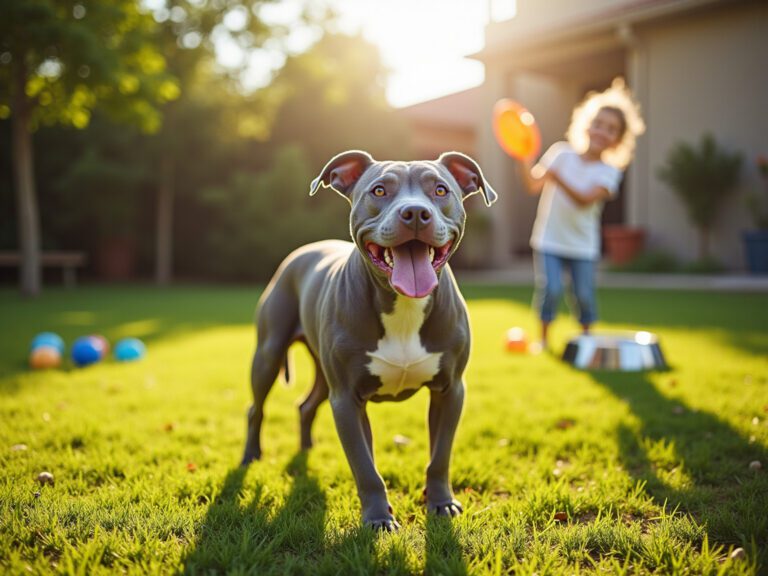7 Key Insights on Can Dogs Eat Bacon Safely
Overview
The title “7 Key Insights on Can Dogs Eat Bacon Safely” raises an important question for many pet owners: Can our beloved dogs safely enjoy bacon? While it’s true that dogs often relish bacon as a special treat, we must consider the health implications.
- The high fat and sodium content in bacon can lead to serious health issues, such as obesity and pancreatitis.
- As caring pet owners, it’s essential to prioritize healthier alternatives that can keep our furry family members happy and healthy.
Let’s explore some nurturing options for their diets together.
Introduction
In the world of pet care, ensuring the health and happiness of your furry family members is paramount, and diet plays a crucial role in achieving this goal. While many pet owners may view bacon as an appealing treat for their beloved companions, the reality is that it poses significant health risks that can lead to serious complications. With obesity on the rise among pets and the potential for conditions like pancreatitis, understanding the implications of feeding bacon is essential.
This article delves into the dangers associated with bacon consumption in dogs, explores healthier alternatives, and offers insights into maintaining a balanced diet that prioritizes canine well-being. By shedding light on these critical aspects, we aim to empower you to make informed decisions that promote the long-term health of your cherished pets. Together, we can create a nurturing environment that supports their happiness and vitality.
Adventure Den: Vancouver’s Premier Dog Daycare for Safe Pet Care
Adventure Den stands out as Vancouver’s premier pet daycare, dedicated to providing a safe and engaging environment tailored for your furry family members. With the largest outdoor play area in the city, dogs have ample space to exercise, socialize, and explore—essential for their physical and mental well-being. This expansive area not only promotes active play but also fosters joyful social interactions among canines, enhancing their overall happiness.
The facility is staffed by passionate animal lovers who offer personalized attention, ensuring that each dog enjoys a harmonious balance of energetic play and restful downtime. This attentive care is further supported by advanced safety measures, including secure fencing and monitored play areas, which are crucial for maintaining a safe haven. Adventure Den’s unwavering commitment to quality care is evident in its strict adherence to Vancouver’s dog daycare safety standards, guaranteeing that every pet is in capable hands.
In addition to outstanding care, Adventure Den presents luxury pet care packages, such as the Barkday Package and Relax To The Max, crafted to provide an extra special experience for pets. With a focus on creating a nurturing atmosphere, the facility has become a trusted choice for pet owners who prioritize the well-being of their beloved companions. By offering a unique combination of spacious outdoor play, dedicated supervision, and a steadfast commitment to safety, Adventure Den sets a high standard in the dog daycare industry. Customer testimonials highlight the positive experiences pets have at Adventure Den, reinforcing its reputation as a premier choice for dog daycare in Vancouver.
Are you ready to give your furry family member the care they deserve? Adventure Den is here to ensure your pet enjoys every moment spent in our loving environment.
Health Risks: Understanding the Dangers of Bacon for Dogs
As a loving pet owner, you may be concerned about the foods you share with your furry family members. When considering whether can dogs eat bacon, it’s important to note that bacon poses considerable risks to canines, primarily due to its elevated fat and salt levels. Regular consumption can lead to obesity, a growing concern among pets, with studies indicating that approximately 56% of dogs in North America are classified as overweight or obese. This condition can result in serious health issues, including pancreatitis, a painful inflammation of the pancreas that can be triggered by high-fat diets.
Additionally, the excessive sodium present in cured meat can lead to dehydration and salt toxicity, potentially resulting in life-threatening conditions. Veterinary specialists emphasize the importance of steering clear of pork products in your dog’s diet, as the dangers greatly surpass any perceived advantages, prompting the question of can dogs eat bacon. It’s crucial for pet owners to stay alert regarding their dogs’ food selections, avoiding high-fat snacks to encourage long-term wellness and well-being.
At Adventure Den, we prioritize the well-being and happiness of every dog. We ensure that they receive the best care and dietary guidance to avoid such risks. By choosing a nurturing environment for your pet, you can help them thrive and enjoy a healthier, happier life.
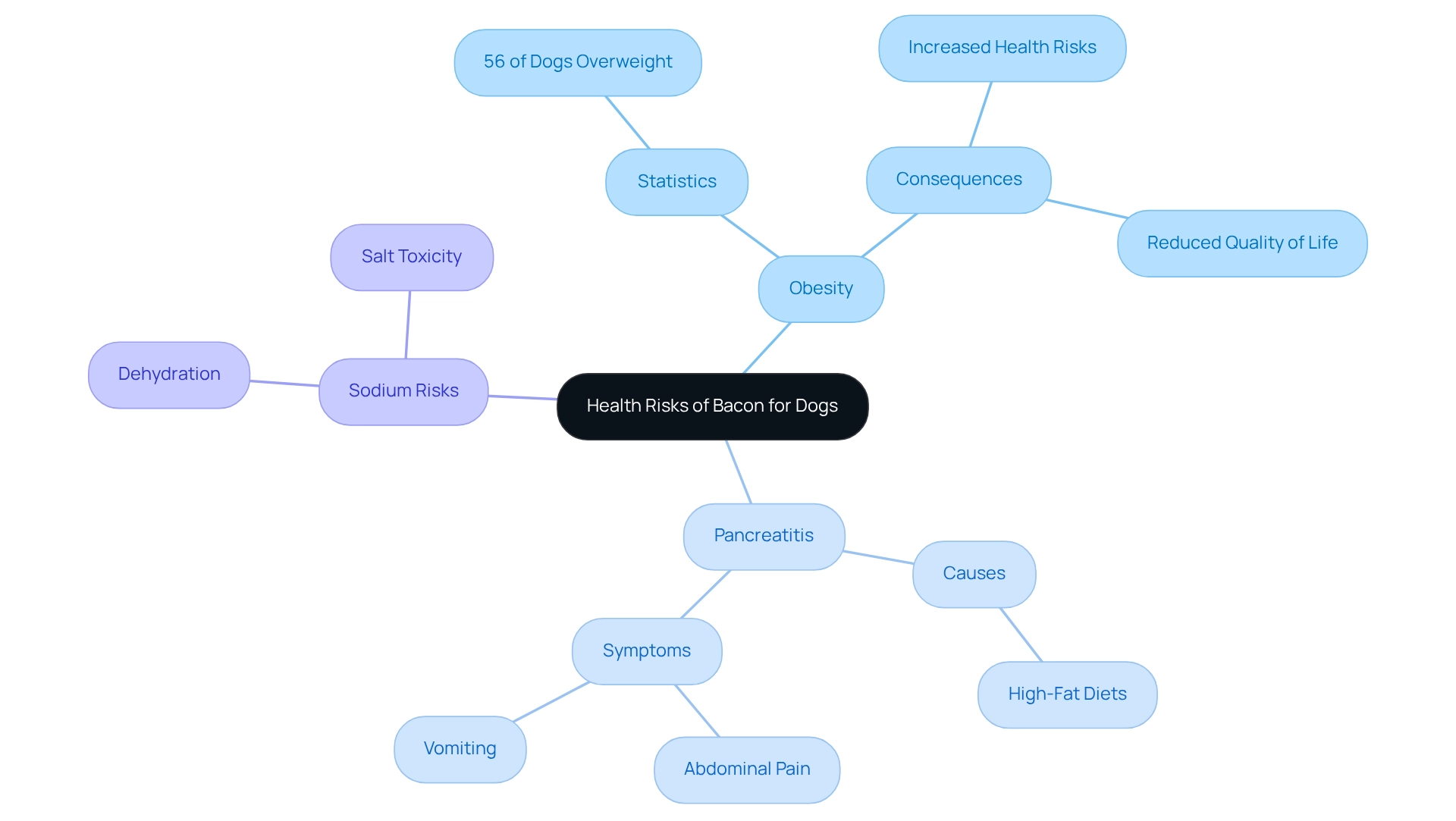
Nutritional Content: What Bacon Really Offers Your Dog
Bacon may be a tempting treat for many, leading to the question of can dogs eat bacon, considering it primarily comprises unhealthy fats and sodium that can overshadow its protein content. A single slice typically contains 40-60 calories, with a significant portion coming from fat. This excessive fat can put a strain on your dog’s digestive system, leading to gastrointestinal distress, so it’s important to consider can dogs eat bacon, as it may cause issues such as vomiting and diarrhea. Moreover, bacon lacks essential nutrients that are crucial for a balanced diet for your furry family members, raising the question of can dogs eat bacon as a suitable choice for regular treats.
Nutritionists highlight that high-fat foods can lead to long-term health issues in dogs, including obesity and pancreatitis. As Lexie Alpeter, a devoted animal enthusiast, shares, “I aim to be a reliable source, blending experience with a dedication to the well-being of pets.” Therefore, while the occasional small piece of bacon can dogs eat may not pose immediate harm, it should not become a staple in your dog’s diet. Thankfully, there are healthier, dog-friendly alternatives available that can provide the nourishment your pet deserves. Let’s prioritize their health and happiness together!
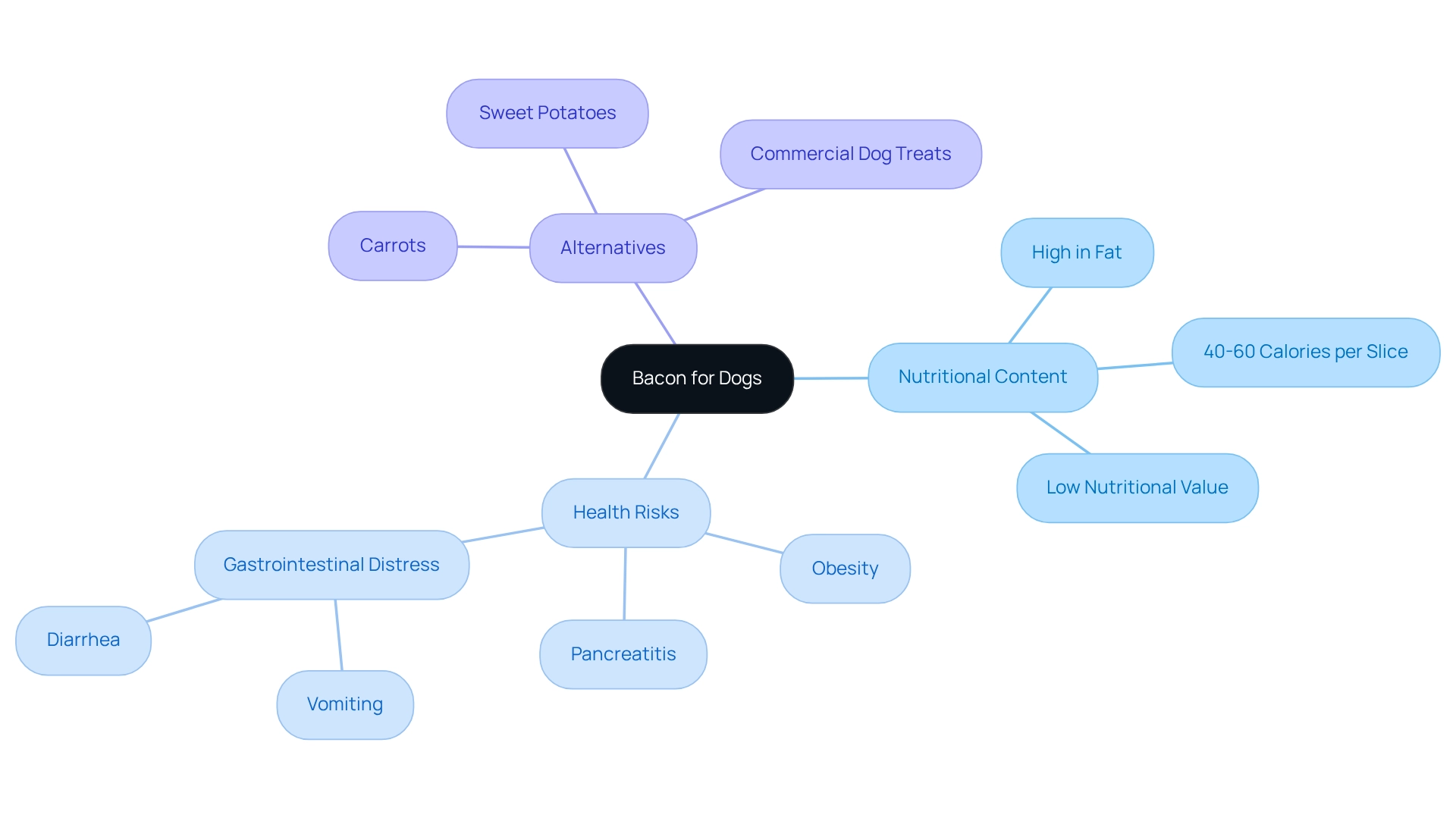
Safe Alternatives: Healthier Treats for Your Dog Instead of Bacon
Instead of opting for fatty meats, consider healthier snack options like carrots, green beans, or small portions of cooked chicken. These choices are not only lower in fat and calories but are also rich in essential nutrients that contribute to your furry family member’s overall well-being. For example, carrots are packed with beta-carotene, which supports good vision and a shiny coat, while green beans provide an excellent source of fiber, aiding digestion and helping to maintain a healthy weight.
Many commercial dog treats are thoughtfully formulated to be nutritious and safe, raising the question of whether can dogs eat bacon without risking their health. Pet nutritionists often recommend incorporating small portions of fruits and vegetables into your dog’s diet, as they offer a variety of benefits. Dr. Tony Buffington, a Diplomate of the American College of Veterinary Nutrition, underscores the value of these alternatives, noting that they can be a wonderful addition to a dog’s diet.
Moreover, brands that prioritize healthy dog treats, such as Blue Buffalo and Wellness, have become increasingly popular, providing options that are both delicious and beneficial. By choosing these nutritious alternatives, you can ensure that your dog enjoys tasty treats while safeguarding their wellness and vitality. Statistics reveal that canines who consume a balanced diet with wholesome treats often see improved overall health outcomes, reinforcing the importance of selecting the right snacks for your cherished pet.
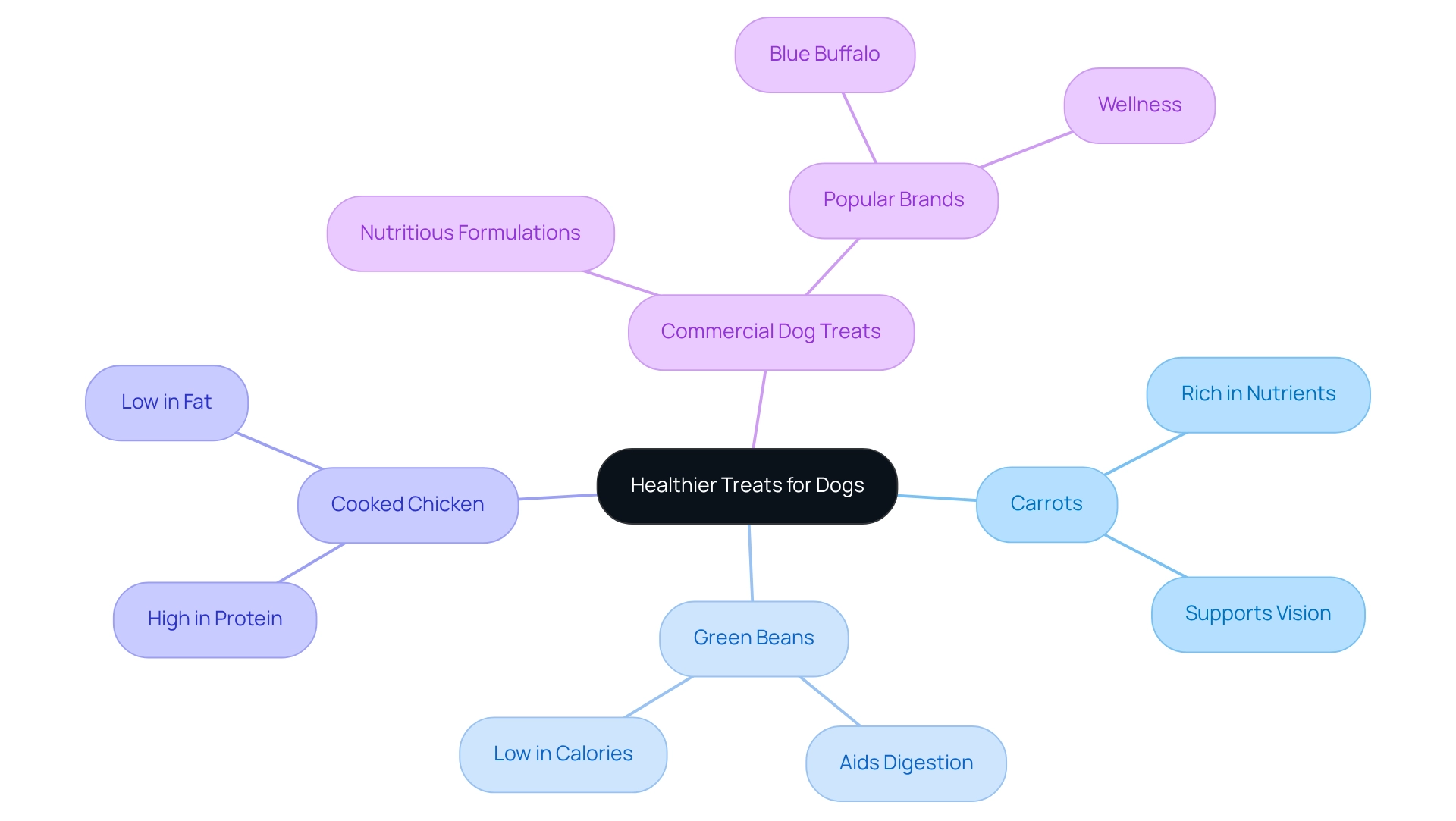
Pancreatitis Symptoms: Recognizing the Signs in Your Dog
As a loving pet owner, it’s essential to recognize the symptoms of pancreatitis in your furry family members. These can manifest in various forms, such as:
- Vomiting
- Diarrhea
- Abdominal pain
- Lethargy
- Loss of appetite
In more severe cases, you might notice your dog adopting a ‘praying position’—stretching their front legs forward while keeping their hindquarters elevated—indicating significant discomfort. Being aware of these signs is crucial, particularly if your dog has indulged in bacon, which raises the question: can dogs eat bacon, as it can trigger or worsen the condition.
Veterinary insights highlight the importance of seeking immediate care; delaying treatment can lead to serious complications. Routine assessments of amylase and lipase levels by a veterinarian are recommended for pets with pancreatitis to monitor their well-being effectively. Statistics reveal that emergency veterinary visits for pancreatitis have remained consistent over the past three years, underscoring the need for pet owners to stay vigilant. In fact, spending on veterinary care is projected to reach $18.3 billion, reflecting a growing awareness of pet health issues.
If you observe any symptoms of pancreatitis, it is vital to consult a veterinarian promptly to ensure your dog’s well-being. Remember, your pet relies on you for support and care. As Caroline Coile, Ph.D., wisely notes, “We make no representations or warranties concerning any course of action taken by any person following or otherwise using the information offered or provided in this article.” Your proactive approach can make all the difference in your pet’s health journey.
Dietary Considerations: Balancing Your Dog’s Nutrition
A balanced diet for your furry family members is essential, incorporating a mix of proteins, carbohydrates, fats, vitamins, and minerals. It’s vital to choose high-quality dog nutrition that fulfills these nutritional needs and adheres to NRC standards for complete and balanced nourishment. Instead of high-fat snacks like bacon, consider offering a variety of nutritious foods that support your dog’s overall health and well-being, and remember to consider if can dogs eat bacon safely.
For instance, nearly any green vegetables can be included, as highlighted by expert Steve Brown. Remember, consulting with a veterinarian can greatly assist in crafting a diet tailored to your dog’s specific needs, ensuring they receive the vital nutrients necessary for their well-being. Your commitment to their nutrition reflects the love and care you provide, creating a nurturing environment for your beloved pet.
Turkey Bacon: Is It a Safe Option for Your Dog?
As a loving pet owner, you may be considering turkey strips as a healthier alternative to traditional pork for your furry family members. However, it’s essential to be aware that these strips still contain significant amounts of sodium and fat. While they may have fewer calories, excessive consumption can lead to similar health risks. For instance, turkey strips typically have about 400-600 mg of sodium per serving, which can contribute to hypertension and other cardiovascular issues in dogs if consumed frequently.
Did you know that just 5 ounces of processed meat a week can increase the risk of heart disease? If you decide to treat your dog with turkey strips, moderation is key. Ensure that the turkey is cooked without any added seasonings or preservatives, as these can be harmful to your pets. Always keep an eye on your dog for any adverse reactions after introducing new foods into their diet.
Veterinary insights suggest that while turkey strips can serve as an occasional treat, they should never replace a balanced diet. The health risks associated with processed meats, including turkey strips, highlight the importance of mindful dietary choices for your pet’s long-term well-being. Ultimately, while turkey strips may seem like a tempting snack, prioritizing your dog’s overall health by limiting such treats and focusing on a nutritionally balanced diet is essential. Your commitment to their health will ensure they thrive in a nurturing environment.

Allergies: Can Dogs Be Allergic to Bacon?
While allergies to bacon are relatively rare, it’s important to recognize that some pets may have adverse reactions to certain ingredients or additives commonly found in processed bacon. If your furry family member shows signs of allergies, such as itching, gastrointestinal disturbances, or skin irritations, it’s essential to pay attention. Studies suggest that dietary allergies are becoming more common, with estimates indicating that approximately 10% of canines may experience some type of dietary allergy. Processed meats like bacon raise the question of whether can dogs eat bacon, as they can be particularly problematic due to their high sodium content and preservatives, which may trigger allergic responses in sensitive dogs. As highlighted by BMC Veterinary Research, ‘The more prevalent a substance is, the more probable the allergy.’
Veterinary specialists emphasize the importance of observing your dog for indications of allergies, especially if they exhibit symptoms like excessive scratching, vomiting, or diarrhea after consuming specific items. If you suspect your dog might be allergic to bacon, you should consult with a veterinarian to determine if can dogs eat bacon safely and to receive an accurate diagnosis and management strategy. An elimination diet, which typically takes between 8 to 12 weeks, is often recommended to identify specific allergens and develop a suitable diet for your pet. This process is vital as it aids in diagnosing dietary allergies effectively. Moreover, if a dog does not have allergies to food, veterinarians can perform other tests to uncover the cause of itching and scratching. By recognizing the potential dangers and signs linked to food allergies, pet owners can make informed choices regarding their dog’s diet and overall well-being.
Emergency Response: What to Do If Your Dog Eats Bacon
If your beloved dog happens to consume bacon, it’s essential to monitor them for any signs of distress, which raises the question: can dogs eat bacon without any issues, such as vomiting, diarrhea, or lethargy? As Nicholas J Clark from the School of Veterinary Science wisely notes, “Vigilant observation is key to ensuring your pet’s well-being after any dietary incident.” Should your furry family member show any concerning symptoms, please reach out to your veterinarian right away.
In some cases, inducing vomiting may be necessary, but this should always be done under the guidance of a veterinary professional. It’s important to remember that many veterinary visits stem from dietary emergencies, highlighting the need for prompt action. By attentively monitoring your dog’s behavior, you can help identify potential medical issues early on, ensuring swift action if needed.
Moreover, real-life experiences at Adventure Den reveal that timely responses can significantly improve outcomes for dogs who consume harmful foods. Your proactive approach can make all the difference in your pet’s health and happiness.
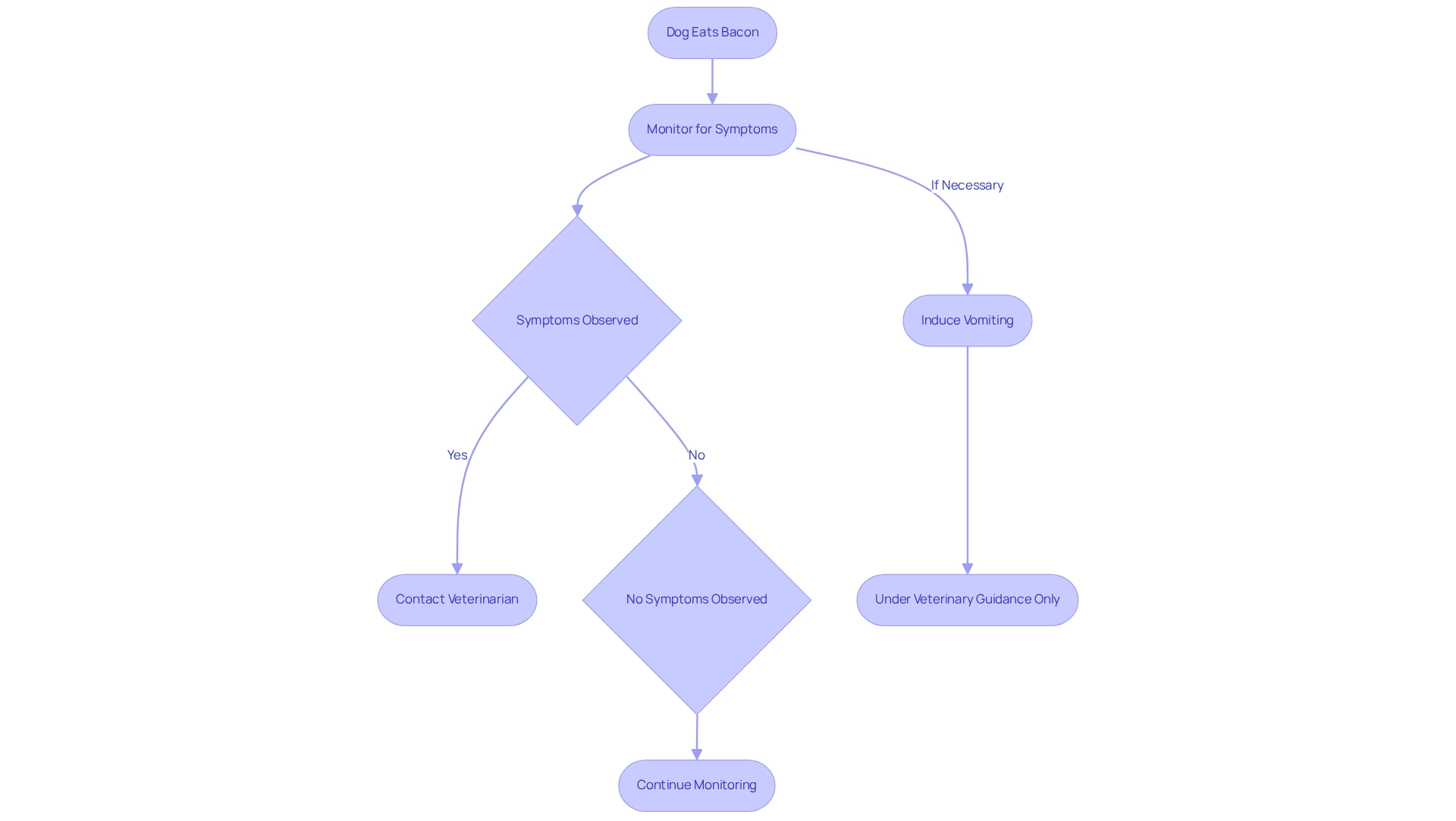
Monitoring: Keeping an Eye on Your Dog After Bacon Consumption
Observing your furry family member after they enjoy pork is crucial for their well-being and safety. Keep an eye out for any unusual behaviors or symptoms, such as:
- Vomiting
- Diarrhea
- Excessive thirst
- Lethargy
- Loss of appetite
These signs may indicate gastrointestinal upset, a common reaction when considering whether can dogs eat bacon, due to its high fat and sodium content. Remember, excessive sodium intake can lead to sodium ion poisoning, which presents severe symptoms requiring immediate veterinary attention.
If you notice signs of gastrointestinal distress, experts recommend feeding your dog lightly. This approach can help prevent further complications. As Himes wisely advises, “Watch for vomiting or diarrhea and GI signs and feed them lightly to help prevent any further GI distress.”
To effectively monitor your dog’s condition after a meal, maintain a detailed log of their behavior and any symptoms that arise. This documentation can be invaluable for your veterinarian in assessing potential health issues related to dietary changes. Understanding the common symptoms of bacon intolerance in dogs—such as abdominal pain and lethargy—can aid in early detection of any adverse reactions, especially when considering if can dogs eat bacon. By being vigilant and proactive, you can ensure your beloved companion remains healthy and happy after indulging in this treat.
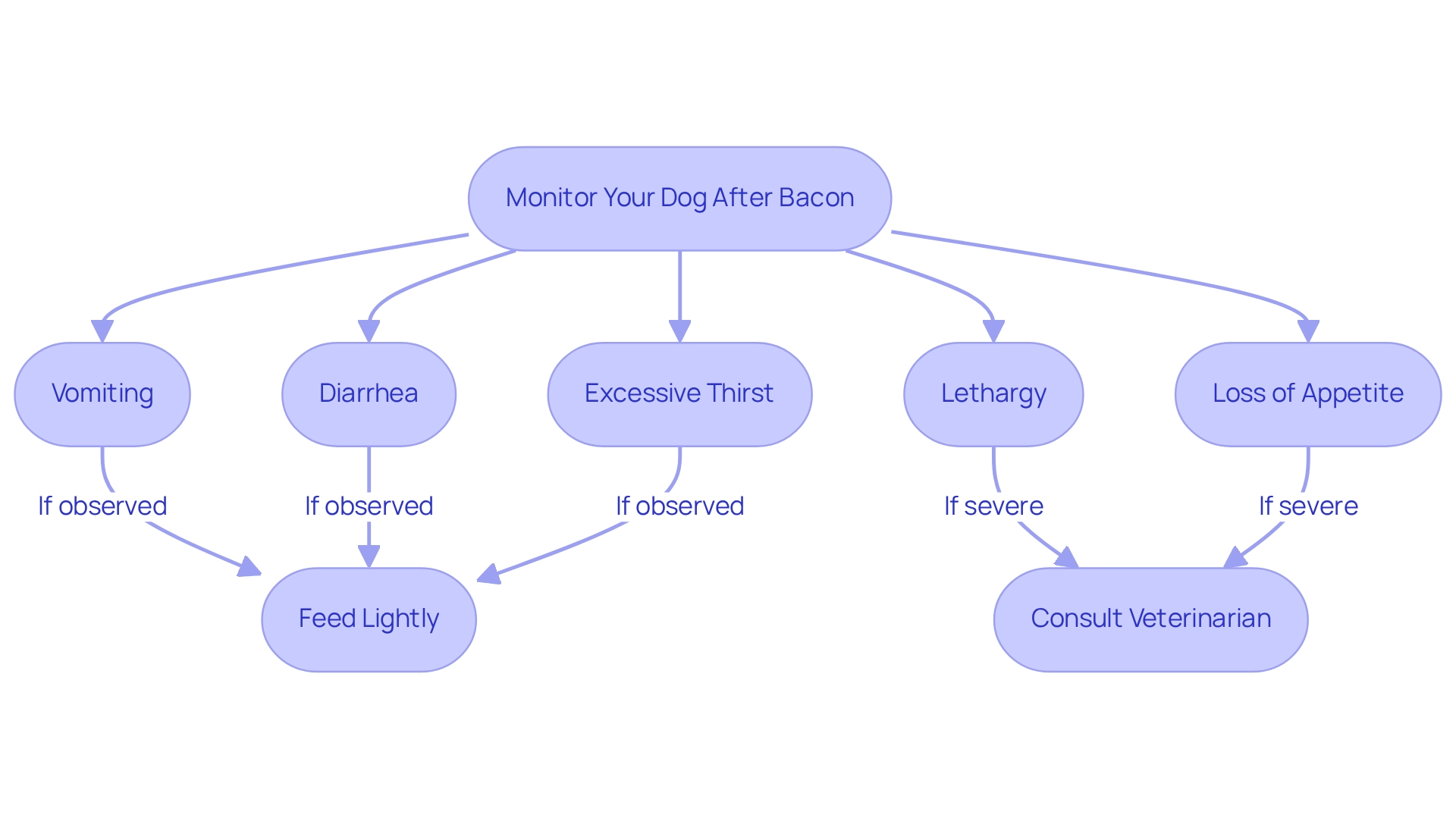
Conclusion
The insights shared in this article truly highlight the significance of mindful dietary choices for your furry family members, especially when it comes to bacon. While it may seem like a tempting treat, the high fat and sodium content can pose serious health risks, including obesity and pancreatitis. As loving pet owners, it’s essential to recognize that the potential dangers far outweigh any fleeting enjoyment a slice of bacon might bring.
Instead of relying on unhealthy options, consider the many nutritious alternatives that can provide your dogs with both satisfaction and health benefits. Incorporating fruits and vegetables like carrots and green beans, or choosing specially formulated commercial treats, can enhance your dog’s diet without compromising their well-being.
Moreover, being aware of the signs of pancreatitis and staying vigilant about any adverse reactions to food is crucial for maintaining your dog’s health. Immediate veterinary consultation can significantly impact outcomes when dietary mishaps occur. Ultimately, prioritizing a balanced diet and making informed decisions about treats will ensure that your dogs lead healthy, happy lives, reinforcing the precious bond between you and your beloved pets.
Frequently Asked Questions
What makes Adventure Den a premier pet daycare in Vancouver?
Adventure Den is recognized as Vancouver’s premier pet daycare due to its commitment to providing a safe and engaging environment, featuring the largest outdoor play area in the city for dogs to exercise, socialize, and explore.
How does the outdoor play area benefit dogs at Adventure Den?
The expansive outdoor play area promotes active play and joyful social interactions among dogs, which are essential for their physical and mental well-being, enhancing their overall happiness.
What safety measures are in place at Adventure Den?
Adventure Den implements advanced safety measures including secure fencing and monitored play areas to ensure a safe environment for all pets.
How does Adventure Den ensure personalized care for dogs?
The facility is staffed by passionate animal lovers who provide personalized attention, balancing energetic play with restful downtime for each dog.
What types of luxury pet care packages does Adventure Den offer?
Adventure Den offers luxury pet care packages such as the Barkday Package and Relax To The Max, designed to provide special experiences for pets.
How does Adventure Den adhere to safety standards?
Adventure Den strictly adheres to Vancouver’s dog daycare safety standards, ensuring that every pet is in capable and caring hands.
What do customer testimonials say about Adventure Den?
Customer testimonials highlight the positive experiences pets have at Adventure Den, reinforcing its reputation as a trusted choice for dog daycare in Vancouver.
Why is it important to be cautious about the foods shared with dogs?
Foods like bacon pose considerable risks to dogs due to high fat and salt levels, which can lead to obesity and serious health issues such as pancreatitis.
What are the potential health risks of feeding dogs bacon?
Regular consumption of bacon can lead to obesity, dehydration, salt toxicity, and gastrointestinal distress, including vomiting and diarrhea.
What dietary guidance does Adventure Den provide?
Adventure Den prioritizes the well-being of dogs by offering the best care and dietary guidance to avoid risks associated with unhealthy foods.


